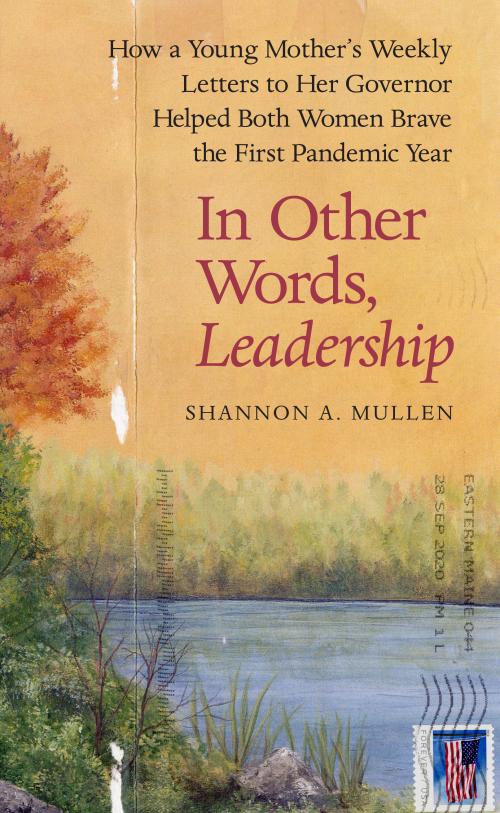Excerpt
CHAPTER 1
“…a leg to stand on…”
The first month of spring in Maine can feel more like winter, with a monochromatic landscape of stubbornly leafless trees, impassive pine forests and bleached coastline. Dirt-covered dregs of snow banks refuse to melt and raw weather stokes resentment of the perpetual need for wool sweaters. For weeks the only things that will grow outside are daffodils and dandelions, with a blinding yellowness that is somehow too much and not enough. That time of year can make even pleasant little villages with cheerful main streets seem disheartened. Maine’s capital city of Augusta had been struggling to muster much cheer for decades before the COVID-19 pandemic arrived in the state. Some downtown areas had been revived with new retail stores but the historic Front Street was lined with dilapidated mill buildings and too many empty storefronts. Against that backdrop, the regal Blaine House, official residence of the governor of Maine, looked almost cartoonishly out of place. The twenty-eight room Federalist mansion, with its porticos and belvederes and black-tipped chimneys, was built in 1833. It stood in especially striking contrast to the atmosphere of the city in the early weeks of Maine’s pandemic response, when a thick crowd of protesters staged a rally outside the building on April 20, 2020, to demand that the state’s first woman governor, Janet Mills, a seventy-two-year-old Democrat, “reopen Maine’s economy”.
Police estimated that there were three to four hundred people on foot, and several dozen in cars circling the area, despite the governor’s order that all Mainers stay home “at all times unless for an essential job or an essential personal reason”. Her order had also directed schools and non-essential businesses to close and imposed capacity limits on establishments deemed essential. Violators faced jail time and a $1000 fine. The Augusta protest, like others around the country, followed complaints by President Donald Trump that some governors were “being unreasonable” and had put “crazy” restrictions in place in response to the coronavirus. An anonymous press release announcing the Maine rally accused Governor Mills of “tyranny”. In a more measured stance, Republican State Representative Chris Johansen, who helped organize the event, said on his Facebook page that Maine businesses were “slowly suffocating”. He encouraged protesters to wear masks and maintain “social distance”, a practice the US CDC defined as avoiding gatherings and keeping six feet away from others. Most of the protesters took none of those precautions. They carried signs with slogans ranging from “All businesses are essential” to “Don’t tread on Me” and “Give me liberty or give me Covid-19.” One man told a reporter that he went to the rally to exercise his constitutional right to free speech so he would not have to use his right to bear arms.
By the date of the protest rally, thirty-five Mainers had died and 875 had tested positive for COVID-19, out of a population of 1.34 million. Nearly five weeks had passed since Governor Mills had declared a Civil State of Emergency on March 15, three days after Maine had confirmed its first case of coronavirus — a Naval reservist in her fifties had tested positive after returning from duty in Italy. The emergency designation had brought the state “to highest alert” and allowed the governor “to deploy all available state resources” and “take every action she reasonably deems necessary” to protect her constituents. She had since drawn both scorn and praise for her use of dozens of executive orders to manage the crisis, including the “Stay at Home” order that barred most public interaction. She had used other orders to deal quickly with issues that arose because of the restrictions, such as expiring driver’s licenses and contact lens prescriptions, and unlawful evictions.
After the lockdown order the owners of two gun stores complained that the governor had “shut them down so people can’t buy guns,” as she wrote in her journal on the last weekend in March. She added that pawn shops and auto dealers were next to object: “Sheesh, who knew all these folks were so essential. In Italy, meanwhile, 10,000 people have died. Surreal.” Governor Mills kept her journal on a laptop and wrote entries almost daily, a habit instilled by her father when she was a child. “He prioritized integrity and character-building,” she explained. “When I was five years old, I had a paper route… and at night I had to keep a journal, even though I couldn’t even write very well.” She added that her parents “wanted us to keep memories and work hard.” She still wrote her entries late at night, after working for several hours before going to sleep, which she rarely did before one o’clock in the morning. At 9:45pm that Saturday, some state lawmakers joined the outcry over gun shops. “The senate Republican leaders… send me a letter demanding that I stop ‘closing gun stores.’ Jesus. Of course, it’s an election year. How could I possibly forget that.” Earlier that day the Trump administration had added gun sellers to its “Guidance on the Essential Critical Infrastructure Workforce” after pressure from gun-rights advocates. The Mills administration was compelled to do the same in Maine and made the change on April 1.
In another journal entry two days later the governor wrote that she had spent “pretty much all day on drafting a new executive order about travel.” She was “trying so hard in each of these actions to find that careful balance between certain constitutional rights and the exigent need to keep people apart and in virtual solitude, isolation.” She compared the crisis to “a hurricane with no wind, a flood with no water”, lamenting that there was “no playbook for a pandemic… no ‘Virus Crisis For Dummies’ instruction manual.” Her administration was “working this, day by day, hour by hour, in the very best way we know how, and with the best scientific, medical information and wise counsel available.”
A former state senator reinforced that dynamic publicly and eloquently in a Maine newspaper opinion column later that month. Jill Goldthwait, who was also a retired nurse, noted that the governor’s resources for managing the pandemic were “not insignificant”, including her cabinet, the nation’s other governors and federal authorities. There were also experts in Maine’s academic and health care communities who were “quick to answer the call”. Ultimately, though, it was the governor’s “unenviable job to sift through the mountain of information and opinion and choose a course for her own state. On top of all that, she is expected to offer human warmth, solace, encouragement and hope.” Jill admonished readers that it was “easy to second-guess the decisions being made that have separated us from friends, family and work and devastated the economy.” In closing she invoked some lyrics from the Alicia Keys song Girl on Fire, noting that it was played at the governor’s inauguration ceremony in January 2019: “She got both feet on the ground and she’s burning it down, she got her head in the clouds and she’s not backing down.” Jill added that Governor Mills was “every bit of that. At least we’ve got that going for us.”
Janet Mills had just turned seventy-two when she was sworn in as Maine’s first woman governor. She was openly exuberant that night when she gave her inauguration speech in a packed convention center in Augusta, wearing a royal blue blazer and pencil skirt, her round, droll face framed by a blonde pixie-cut. When the COVID-19 pandemic started, Governor Mills had been in office for little more than a year, but had decades of experience in politics, state governance and practicing law. Her family had a prominent legacy of public service, but her own track to the state’s highest office was refreshingly unusual, not least because it included multiple derailments. She was born in Farmington, in the foothills of Maine’s western mountains, and had lived in the state for most of her life. As a child she delivered newspapers and sometimes assisted her grandfather, a town clerk, with issuing marriage, fishing and dog licenses. She loved comic books, though they featured “mostly male superheroes” like Superman and Spiderman, and she read them “every day after school (sometimes during school).” At age fifteen she had two surgeries to correct spinal curvature from severe scoliosis and spent most of that year in a hospital bed in her family’s living room, wearing a cast from her hips to her neck. “I think that kind of thing, when a kid goes through something like that, you learn some patience,” she said. Tutors helped her keep up with school. She also developed her wry and slightly corny sense of humor. “I would lie around and write jokes,” she remembered. “What else do you do when you can’t do anything?”
After high school she enrolled at Colby College in Maine but “didn’t take it terribly seriously” and dropped out after three semesters. The school had been “[t]oo close to home… only thirty-eight miles from my house”, she said. Both her parents had studied there and they “kept showing up. You know, if I’d go to a fraternity party after the football game and try to have fun… my father and mother would walk in the door. You can’t have fun as a college kid when your parents are right behind you.” She had “no aims” other than not wanting to “go straight through school or have any big career goal to begin with”, so she moved to San Francisco during the Summer of Love in 1967. “[S]o much was happening in the world and I just wanted to see a lot of things and a lot of places, like a lot of young people.” The next year, though, she enrolled at the University of Massachusetts in Boston. “I think I got a 4.0 the first semester,” she said. “I worked hard and I enjoyed it more.” She also studied in Paris at the Sorbonne and learned to speak French. During the Christmas holiday that year she went hitchhiking in southern Spain, where the poet Federico García Lorca grew up — she loved his work, which was “contraband” under then-dictator Francisco Franco, and she would read it to the young people who gave her rides, if they weren’t singing “the universal language” of Beatles songs.
After graduating with a bachelor’s degree in French and a minor in English, she spent a couple of years in Washington, DC, working for a law firm that handled intellectual property. “I was secretary… then I was their first paralegal,” she recalled. She quickly realized that the men she worked for “were making a lot of money and… I can draft this, I can draft that, you know, feeding them stuff, maybe I should go to law school.” Around that time she went through a traumatic breakup with the boyfriend she had been living with. She described him as “a lovable, intelligent, good-looking alcoholic, and when he was drinking he played with guns.” She added: “I was going to save him because, yeah, that always works!” One night when he was drunk, he held one of his guns, loaded, to her head. She escaped unharmed and never saw the man again, returning to their apartment with a friend only to take the guns apart and dispose of the ammunition. Then she moved back to her home state to earn a law degree from the University of Maine. During her studies she started working in a district attorney’s office. Again she found herself thinking, “Hey I can do this, I know the rules of evidence, I can put on a case, and putting together the puzzles of a trial was fun — oral argument, closing argument, all those things.”
After law school she worked as an assistant attorney general until there was an opening in a DA’s office when its occupant left to become US Attorney. “There were no women DAs… none, and I thought, well, I’ll try it.” She sought the interim appointment from Maine’s governor, for whom she had worked when he was the state’s attorney general, and won, beating out some male candidates who had “been there a while, felt they deserved it, merited it.” Almost immediately she had to launch her formal campaign for the office. “I ran around three counties, I talked to Democrats everywhere and gave little stump speeches,” she remembered, adding with a laugh that she had “never done that before, never.” She won the election, becoming the first woman DA in New England, and was re-elected three times.
DA Mills was the first member of her family to leave the Republican party. She made the decision during law school, where hers was “the first class to have any substantial numbers of women… about a third.” The shift had been “a natural inclination after the experiences of the sixties” — she had “marched a few times” against the Vietnam War and the causes she cared about, such as the country’s voting age and “so-called ‘women’s issues’” skewed more Democratic than Republican. She also mentioned the influence of the Watergate scandal, which played out while she was working in Washington; she remembered standing outside the White House the night President Nixon resigned. “It was just an incredible evening, the vibrations in the air, the most bizarre groups of people gathering, they didn’t know why, some of them.” Watergate then loomed over her law school studies. “[W]e focused so much on ‘what’s this going to do [to] the legal profession’, because so many lawyers were involved in such evil ways. And the law schools I think, nationwide, felt that they had to start concentrating on ethics”.
Her parents’ response to her change of party was no worse than when she “dropped out of Colby College, their alma mater, and left town, you know, for San Francisco… after that nothing could shock them.” She added: “I think they were glad I wasn’t something else, something lower than a Democrat.” The Mills clan was among a succession of prominent civic leaders from Maine who had made outsize and enduring contributions to American political affairs as representatives of one of the country’s least populous states. All four of the governor’s grandparents held elected public office. Her father, a World War II veteran, served as US Attorney under Presidents Eisenhower and Nixon, as well as in both houses of the Maine legislature. Her younger sister, Dr. Dora Anne Mills, was a physician who led the state’s Center for Disease Control and Prevention for nearly fifteen years, starting in the late 1990s, and went on to serve in other leadership roles in Maine’s healthcare system. The Governor’s older brother Peter served in both chambers of the state legislature and as director of the Maine Turnpike Authority. Another brother, Paul, was an energetic estate lawyer with an encyclopedic knowledge of political history. He had served as moderator at more than 200 town meetings in Maine and was a regular columnist for a regional newspaper.
The Mills family had been called a political dynasty in the state, a term that Paul dismissed as inaccurate hyperbole. “It wasn’t as if we had a morning line,” he explained, pointing to two unsuccessful gubernatorial bids his brother Peter made. Another case in point was a campaign for Congress that DA Mills ran briefly in 1994, when she was routed during the primary election. Those losses illustrated that “people evaluate her, and us, on our own merits,” Paul said. The governor’s close friend Charlie Miller believed that not even the Mills family would have predicted her election. “She wasn’t the one who was… perceived as going to be successful, or beautiful, or personable, or charming — a winner,” he said. “When she ran for governor, and she won, her siblings could not have been more supportive and I don’t think they could have been more surprised.”
Regardless of their interest in seeking office, the Mills children “heard a lot about politics” when they were growing up. One outsize influence was their parents’ close friend, Republican US Senator Margaret Chase Smith, the first woman elected to both chambers of Congress. A favorite family story recalled photographs of Senator Smith holding a newborn Janet Mills, who later memorized the senator’s famous “Declaration of Conscience” speech. The 1950 speech denounced Wisconsin US Senator Joseph McCarthy’s conduct but never mentioned his name — Senator Smith instead rejected her party’s embrace, during McCarthyism, of “a philosophy that lacks political integrity or intellectual honesty”. The nation “sorely” needed GOP leadership, she told her colleagues. “But I do not want to see the Republican party ride to political victory on the Four Horsemen of Calumny – Fear, Ignorance, Bigotry, and Smear.” A teenaged Janet Mills delivered the fifteen minute speech for a high school contest and won.





